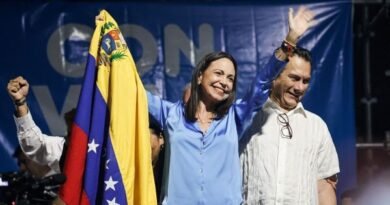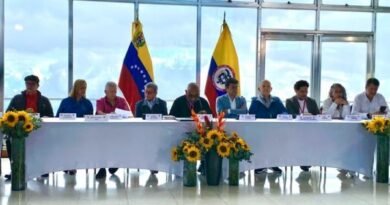UK, Guyana mocking Venezuela, Maduro warns
[ad_1]
UK, Guyana mocking Venezuela, Maduro warns
Maduro also said Milei wanted to turn Argentina into the new colony in South America
In a year-ending interview with Le Monde Diplomatique’s Ignacio Ramonet, Venezuelan President Nicolás Maduro said his Guyanese counterpart Irfaan Ali was mocking his country and other regional multilateral organizations who sponsored the St Vincent and the Grenadines understanding whereby the dispute over the oil-rich Essequibo area would not escalate.
We are going through a moment of turbulence, said Maduro, because Guyana is not acting as the Cooperative Republic of Guyana but as ‘British Guyana’, [when] accepting that a warship goes to its coasts and from its coasts threatens Venezuela, in addition to impertinent, insolent statements of the British Foreign Ministry.
Ali acts like a president of a colonial British Guyana, Maduro went on. He is acting like a country that is in bondage, subjugated. I do not accept his excuses, I do not accept them!
The Bolivarian leader dubbed the United Kingdom as Ali’s owners and spoke of the old and decayed and rotten former British empire.
They believe that Venezuela is the Venezuela of 1902 when they came with their ships to bombard Maracaibo, Puerto Cabello, La Guaira; when they came to massacre the people of Venezuela to impose the Arbitral Award of 1899, to collect the illegal, immoral debts of the 19th century. No, Venezuela is not the Venezuela of 1902. The Venezuela that Cipriano Castro had. No, it is not. It is a Venezuela that has a military might to respond, he warned.
Maduro then insisted both London and Georgetown were mocking Brazilian President Luiz Inácio Lula da Silva and Celac pro-tempore President Ralph Gonsalves while making fun of all the Caricom countries… By threatening Venezuela with a military ship, they have mocked, and they have kicked the Argyle Agreement, they have kicked it! Maduro stressed. As head of state and commander in chief of the Armed Forces … I have to defend the dignity of Venezuela, he went on.
And nobody here is going to threaten us with ships. Neither today nor ever. This is not the Venezuela of 1902. Make no mistake about Venezuela. Make no mistake, Maduro further commented on the dispatching of the Royal Navy’s HMS Trent to Guyana.
The Venezuelan leader also underlined this was a new era that came after the one of Western empires. The last of the Western empires, the American empire, is in a process of historical decline that is structural, it is definitive. The United States will always be a power if it remains united; if several states do not emerge from it, Maduro explained.
It is like the United Kingdom, Great Britain was a military, economic, commercial, commercial, naval super empire… And well, it ceased, fell, declined… But it is still a powerful, important country, he reckoned.
In line with this rationale, Maduro sees the BRICS bloc as the main player of the future. He hopes his country fully joins the alliance during this year’s summit in Kazan, Russia, in October.
He also said Argentine President Javier Milei’s decision not to enter the bloc was a foolish act through which the country was pushed back into the 19th century. Milei envisions Argentina as a vassal of the imperial unipolar world. It will be the new colony from South America. By taking Argentina out of the BRICS, Milei is acting against the Argentines, against the Argentine worker, against the Argentine businessman. This shows what a backward colonial project of the 19th century is, a project that has failed since its inception, he elaborated.
We are betting on the BRICS as part of that new world, the new balance, as part of the Bolivarian geopolitical concept of a world of balance, of a world of equals, Maduro highlighted while underscoring the bloc’s cultural heritage: the Chinese, Russian, and Indian civilizations, plus Brazil and South Africa. And we are part of the mestizo civilization of South America, the Caribbean, Latin America. So the BRICS fill us with emotion.
[ad_2]
Source link




